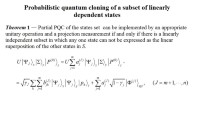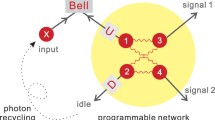Abstract
In this article we make a review on the usefulness of probabilistically cloning and present examples of quantum computation tasks for which quantum cloning offers an advantage which cannot be matched by any approach that does not resort to it. In these quantum computations, one needs to distribute quantum information contained in states about which we have some partial information. To perform quantum computations, one uses state-dependent probabilistic quantum cloning procedure to distribute quantum information in the middle of a quantum computation. And we discuss the achievable efficiencies and the efficient quantum logic network for probabilistic cloning the quantum states used in implementing quantum computation tasks for which cloning provides enhancement in performance.
Similar content being viewed by others
References
Wootters W K, Zurek W H. A single quantum cannot be cloned. Nature, 1982, 299: 802–803
Dieks D. Communication by EPR devices. Physics Letters A, 1982, 92(6): 271–272
Bennett C H, Brassard G. Quantum cryptography: public key distribution and coin tossing. In: Proceedings of IEEE International Conference on Computers, Systems and Signal Processing, Bangalore, India. New York: IEEE, 1984, 175.
Gisin N, Ribordy G, Tittel W, et al. Quantum cryptography. Review of Modern Physics, 2002, 74: 145–195
Wang X B, Hiroshima T, Tomita A, et al. Quantum information with Gaussian states. Physics Reports, 2007, 448: 1–111
Long G L, Deng F G, Wang C, et al. Quantum secure direct communication and deterministic secure quantum communication. Frontiers of Physics in China, 2007, 2: 251–272
Bužek V, Hillery M. Quantum copying: Beyond the no-cloning theorem. Physical Review A, 1996, 54: 1844–1852
Bužek V, Hillery M, Bednik R. Controlling the flow of information in quantum cloners: Asymmetric cloning. Acta Physica Slovaca, 1998, 48: 177–184
Bruß D, Ekert A K, Macchiavello C. Optimal universal quantum cloning and state estimation. Physical Review Letters, 1998, 81: 2598
Bruß D, Macchiavello C. Optimal state estimation for d-dimensional quantum systems. Physics Letters A, 1999, 253: 249
Bužek V, Braunstein S, Hillery M, et al. Quantum copying: A network. Physical Review A, 1997, 56: 3446–3452
Cerf N J. Asymmetric quantum cloning in any dimension. Journal of Modern Optics, 2000, 47: 187–209
Gisin N. Quantum cloning without signaling. Physics Letters A, 1998, 242: 1
Gisin N, Massar S. Optimal quantum cloning machines. Physical Review Letters, 1997, 79: 2153
Keyl M, Werner R F. Optimal cloning of pure states, testing single clones. Journal of Mathematical Physics, 1999, 40:3283
Werner R F. Optimal cloning of pure states. Physical Review A, 1998, 58: 1827
Duan L M, Guo G C. Probabilistic cloning and identification of linearly independent quantum states. Physical Review Letters, 1998, 80: 4999
Duan L M, Guo G C. Linearly-independent quantum states can be cloned. Communications in Theoretical Physics, 1999, 31: 223
Bechmann-Pasquinucci H, Gisin N. Incoherent and coherent eavesdropping in the six-state protocol of quantum cryptography. Physical Review A, 1999, 59: 4238
Galvão E F, Foundations of quantum theory and quantum information applications. arXiv: quant-ph/0212124.
Galvão E F, Hardy L. Cloning and quantum computation. Physical Review A, 2000, 62: 022301.
Gao T, Yan F L, Wang Z X. Achievable efficiencies for probabilistically cloning the states. Journal of Physics A, 2004, 37: 3211
Gao T, Yan F L, Wang Z X. Probabilistic cloning and quantum computation. Chinese Physics Letters, 2004, 21: 995
Gao T, Yan F L, Wang Z X. Quantum logic network for probabilistic cloning quantum states. Communications in Theoretical Physics, 2005, 43: 73
Lo H K, Popescu S, Spiller T, eds. Introduction to Quantum Computation and Information. Singapore: World Science, 1998
Feynman R. Simulating physics with computers. International Journal of Theoretical Physics, 1982, 21: 467
Shor P W. Algorithms for quantum computation: discrete logarithms and factoring. In: Proceedings of the 35th Annual Symposium on Foundations of Computers Science. 1994: 124
Author information
Authors and Affiliations
Corresponding author
Rights and permissions
About this article
Cite this article
Gao, T., Yan, F., Wang, Z. et al. Quantum probabilistically cloning and computation. Front. Comput. Sci. China 2, 179–189 (2008). https://doi.org/10.1007/s11704-008-0019-6
Received:
Accepted:
Published:
Issue Date:
DOI: https://doi.org/10.1007/s11704-008-0019-6




